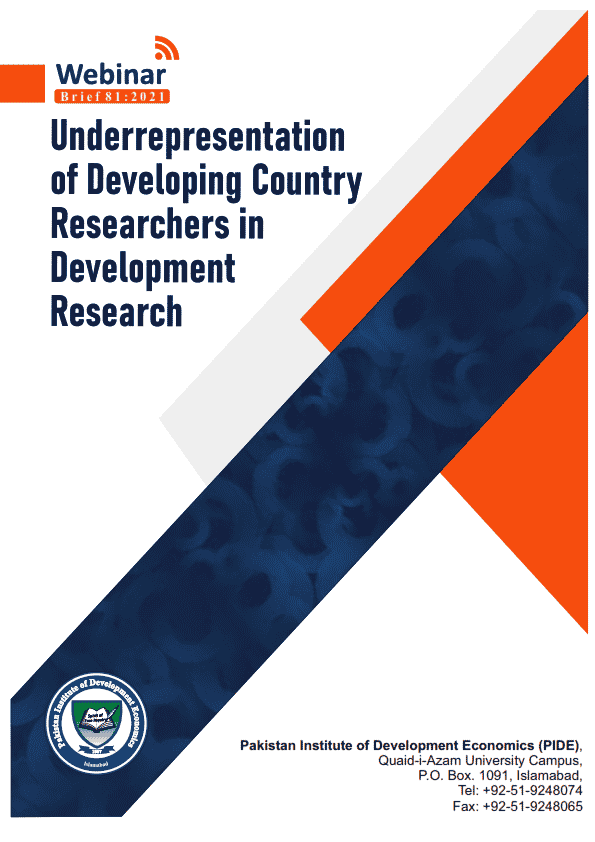Underrepresentation of Developing Country Researchers in Development Research
Underrepresentation of Developing Country Researchers in Development Research
Economic research in developing nations is nearly entirely conducted by researchers based in the United States and Europe, rather than in these countries. There is a growing acknowledgment that a researcher’s knowledge of a nation and long-term residence in the country are likely to provide unique insights into the formulation of research questions, the application of the methodology, and the interpretation of results. Lately, the merits of diversity in the economics profession, as well as the negative consequences of minorities’ low participation have been acknowledged. According to many studies, the majority of the researchers are concentrated in the United States and Europe. Scholars have also discovered that African-based researchers are underrepresented in publications focused on development in Africa.
People living in the global south seem to be the subjects of research but not researchers themselves. Although a large number of efforts were made by the developed countries to build the capacity of research in less developed countries, it looks like the capacity building is another way of saying that these researchers can’t join the club. While going to the top conferences in Washington and Oxford, one realizes that many more researchers from developing countries need to tell their stories. Researchers from developing countries are not represented at the tables in the rooms where the problems are being discussed where the future of their countries is being discussed.
Key Objectives
- To understand how researchers from developing countries are represented in various areas of development research
- To know the extent of the problem
- To understand the reasons for disparities in the global development research
- To develop possible remedies for the underrepresentation of researchers from developing countries
Key Messages: Prof. Ronelle Burger and Prof. Veronica Amaramte
- In development research, a generic but hopeful narrative about development in developing countries is promoted that misses problems that are deeper and more systemic such as problems of governance and ownership.
- Researchers from the developing countries are seriously underrepresented in the several key development conferences
- In the key development conferences hosted in developed countries, the role played by researchers from developing countries is insufficient and marginal. It provides support for the intuitive notion that the location of the conferences influence regional representation.
- In the case of representation of developing countries’ researchers in development journals, submissions from southern researchers were much less likely to be reviewed than submissions from researchers based in Northern countries.
- The rate of acceptance of research over total submissions is more than twice for northern researchers than for southern ones. This difference is even larger in the case of many highly reputed development research journals.
- Southern researchers not only published less but also cited less. There are fewer citations for Southern-authored articles than for Northern-authored articles and South-North collaborations.
- The underrepresentation of researchers from developing coubntries in development research might plausibly be attributed to deficiencies in research skills, English language proficiency, scientific networks, and access to research funding and travel grants.
- There is very isometric access to travel funds and access to visas to travel. In many African countries, a visa can cause a researcher to lose two to five working days. Visa processes are incredibly unpredictable and poorly managed.
- It is also likely that the underrepresentation is the result of a culture of exclusivity in the economic profession.
- Talented researchers from low-income countries cannot usually stay in their home countries. They need to go abroad because the opportunities are more and they will only be able to flourish overseas.
- We must create real pathways for excellence in developing countries that researchers can participate in the international dialogue and do exciting work while staying in their home country.
- Different donors can step in this by creating research opportunities in developing countries. The north-south collaborations are important but only if they’re equitable. Historically these relationships have been very inequitable and do not work to the advantage of both parties.
- The developing country partners are essentially data gatherers and are not often trusted to analyze the data. So, these types of partnerships just widen the divide. There is a need to create platforms where ideas can be shared between think tanks and universities of low-income and high-income countries.
- Practices and paradigms that exclude Southern researchers from academic dialogues about development in the South inhibit the plurality and richness of such dialogues.
Conclusion
People living in the global south seem to be the subjects of research but not researchers themselves. Although a large number of efforts were made by the developed countries to build the capacity of researchers in less developed countries, it looks like the capacity building is another way of saying that these researchers can’t join the club. It is not encouraging that the bulk of research on the low-income countries is conducted by researchers from the high-income countries. The underrepresentation of Southern researchers in research on development in the South might plausibly be attributed to multiple factors. Equitable collaboration between researchers of low-income countries and high-income countries could be one of the solutions. In addition to this, expanded scientific networks help young second language English scholars to publish.




